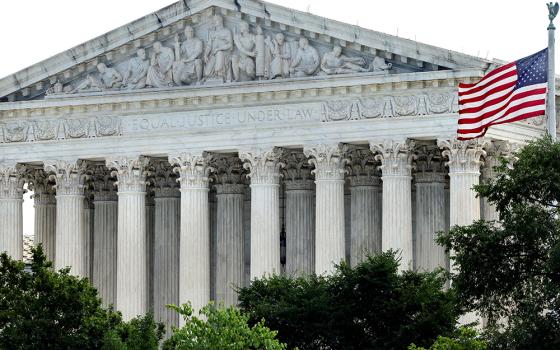Something remarkable happened yesterday in the United States Senate: The filibuster died. Yes, the vote yesterday only applied to executive branch and non-Supreme Court judicial branch nominees, but it is hard to believe that a future Senate majority leader, facing obstruction over routine legislation or a nominee to the Supreme Court, will not follow the path trod by Senate majority leader Harry Reid. It is no time for celebration but also no time for tears.
The filibuster was designed to protect the rights of the Senate minority. The chamber has long held to rules that give a disproportionate power to individual members. The requirement of a super-majority to enact legislation and approve nominees was intended to force bi-partisanship and consensus on a chamber that was conceived by the Founders to be free from faction, but devolved into factionalism from its beginning. For many years, the filibuster performed the role it was intended to perform. Frustrating though it was, say, during the efforts to enact civil rights legislation, the filibuster embodied a certain wisdom. Major changes in government policy should require more widespread support, and the consequent legitimacy, than a 51-49 party-line vote would suggest. And, in recent years, the unhappily named “Gang of 14” or “Gang of 12” would emerge, a group of centrist senators intent on forging bi-partisan solutions to intractable problems.
But, during the Obama years, the filibuster ceased to perform its function. It did not protect the rights of the minority so much as it gave that minority effective control of the chamber. The filibuster was abused. The effort to enact the Affordable Care Act was wildly distorted by the unanimous opposition of Senate Republicans. When they failed to derail the Dodd-Frank financial regulation, they tried to undo it by refusing to confirm anyone to serve as head of the Consumer Financial protection Bureau. And, in recent weeks, the Senate Republicans blocked the appointment of three highly qualified nominees to the U.S. Court of Appeals for the District of Columbia, including a woman who served in the Bush administration. That was the straw that broke the camel’s back and this particular camel turned out to be the legislative equivalent of the Enola Gay. My friend Rick Hertzberg, writing at the New Yorker, explores with his typical flair, the usefulness of the “nuclear option” metaphor, correctly pointing out that “What happened today isn’t Hiroshima; it’s arms control.”
Republicans countered that Reid’s decision is short-sighted, that soon, perhaps as soon as January 2015, they will control the chamber. Sen. Charles Grassley warned darkly: “If the Democrats are bent on changing the rules, then I say go ahead. There are a lot more Scalias and Thomases out there that we would love to put on the bench.” The analogy fails to persuade because, in fact, Senate Democrats did not filibuster the nomination of either man, in fact, Scalia was approved on a vote of 98-0. And, while the Democrats can rightly be faulted for their often scurrilous attacks on Justice Robert Bork, his defeat had nothing to do with the filibuster: His nomination failed on a vote of 42 in favor and 58 against.
There are three distinct areas of Senate action in which the filibuster can, and should, be considered differently. Executive branch nominations are the easiest: Any president should largely have the right to appoint her own team. Judicial nominations are different because justices serve for life. The democratic process offers no remediation. I worry that by ending the right to filibuster a judicial nomination, presidents from both parties will be inclined to appoint more extreme nominees. Legal theory is one of the most fraught, contentious arenas in modern politics. The filibuster helped to guarantee that presidents of both parties maintain an interest in appointing the kind of centrist nominees that could garner sixty votes. To be clear, I blame Sen. Mitch McConnell for the current mess, but Reid’s solution does nothing to help. Look for the judiciary to become even more divided by judicial philosophy.
The third area, one not addressed yesterday, is the passage of routine legislation. Here, the case for the filibuster is at is most complicated. As mentioned, major legislative overhauls should command broad support. On the other hand, there is a built-in check on either parties’ eagerness to enact extreme legislation. We still have elections. But, sadly, we also have a fickle populace that could, when frustrated with, for example, the rollout of the ACA, vote in a majority that overturns it. Legislation that deeply impacts society could see a roller-coaster, first one set of rules, then another set of rules, in short order. This is especially problematic for legislation like the ACA which will require many years for its benefits to be felt, and those benefits weighed against its flaws. We must hope and pray that the Senate will continue to produce “Gangs of 14” to draft centrist legislation that can survive the election-cycle. And, the fact that Senate races are not subject to re-districting means there will always be a body of senators from purplish states with a vested interest in moderation.
In the final analysis, however, our nation is a democracy and the filibuster was a profoundly anti-democratic tool, unique to a profoundly anti-democratic chamber. The good people of Wyoming, with barely more than half a million residents, are represented by two senators as are the good people of California, all 38 million of them. Is it not bizarre that seven states – Alaska, Delaware, Montana, North Dakota, South Dakota, Vermont and Wyoming – all have two senators but only one Representative in the House? In some respects, perhaps the founders built better than they knew. But, in America today, where demographics define politics as never before, rural, white America is so vastly over-represented in the Senate chamber, it is difficult to imagine the founders endorsing the current anti-democratic flavor of the Senate.
Yesterday, the filibuster died, or at least received a mortal wound. It is not the best thing to happen in this town in awhile and it is not the worst. At the end of the day, the only real check on our government is us, the voters, and that is as it should be.






